Stereo-70 / Stereokino |
Read more at in70mm.com The 70mm Newsletter |
| Written by: Alexander Melkumov, President & Director of Photography, Stereokino | Date: 16.04.2017 |
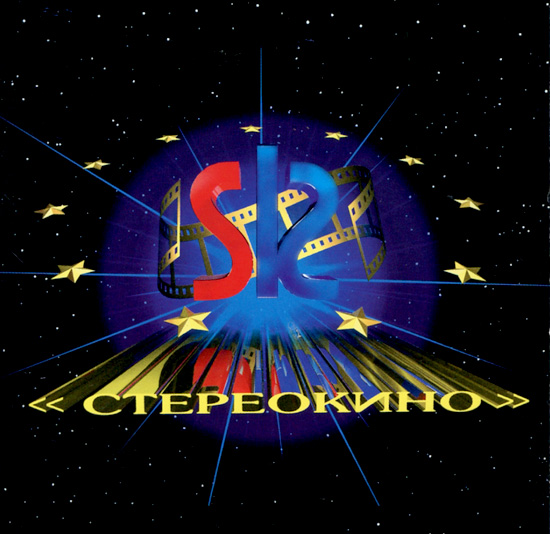 The
history of origination and development of stereo-cinema in the USSR is
rooted in the 1930's. But most important mark in its development came in
1941. In February of 1941 in Moscow, at a movie theater "Moscow" (nowadays
"House of Khanzhonkov"), a premiere of three-dimensional film "CONCERT" was
held. The uniqueness of this event was that due to the light absorbing
raster screen the spectators could observe 3D images without any individual
devices (glasses etc.). The
history of origination and development of stereo-cinema in the USSR is
rooted in the 1930's. But most important mark in its development came in
1941. In February of 1941 in Moscow, at a movie theater "Moscow" (nowadays
"House of Khanzhonkov"), a premiere of three-dimensional film "CONCERT" was
held. The uniqueness of this event was that due to the light absorbing
raster screen the spectators could observe 3D images without any individual
devices (glasses etc.).It was the first commercial demonstration in the world of a stereo film without glasses. The form of the screen was unusual - an upwards extended rectangle with a ratio of the sides 5:3. Left and right frames of stereo pair had the same ratio of the sides, which was dictated by their horizontal layout on one standard frame of a 35mm film. As far as we know, in the "Concert" movie, horizontal placement of the right and left images of stereo pair on each 35mm frame was used for the first time. In this sense it is fair to consider the given system as a first prototype of today's system "STEREO-70". For shooting a usual for those times 35mm camera has been used. In front of the camera two mirrors were installed. The projection of film was conducted using 35mm film projector equipped with a similar two-mirror device. The film consisted of several concert numbers or scenes, which most effectively presented the "third" dimension, being in front as well as behind the screen, creating the impression of something coming out of the screen and into the hall and so forth. |
More in 70mm reading: Stereo-70 Films 3D in the mid 60s in Europe with Hi-Fi Stereo 70 Sovscope 70 Internet link: Stereokino Stereokino on YouTube About Stereo-70 equipment rent or purchase, please, contact: Alexander Melkumov, President Director of Photography stereokino@mail.ru StereoKino Center Leningradsky prospect 47 25167 MOSCOW Russia Tel/fax +7(495)771-74-60*1309 (1300) |
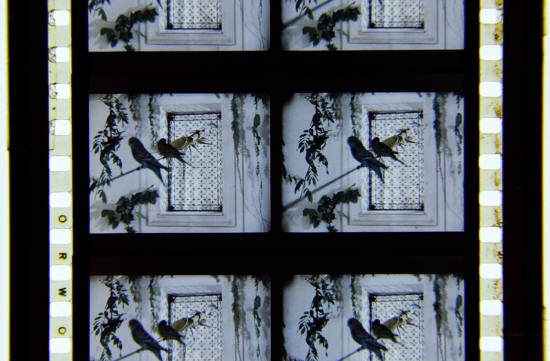 "STEREO
70" 3D film printed on ORWO 70mm stock. Frames supplied by Alexander
Melkumov. "STEREO
70" 3D film printed on ORWO 70mm stock. Frames supplied by Alexander
Melkumov.Click to see enlargement Singularity of the show, visible spatiality of the images, originating without glasses and generally without any technical devices, have achieved huge success of a show. Until these days the majority of the older spectators, link their experience of stereo-cinema perception with unforgettable impression of youth or childhood from review of stereo films at the "Moscow" 3D movie theatre. The Second World War, which reached the USSR several months later, had disrupted operation of the "Moscow" movie theater. It was the world's first commercial movie theater with raster screen system, ensuring separation of the left and right images of the stereo pair. |
|
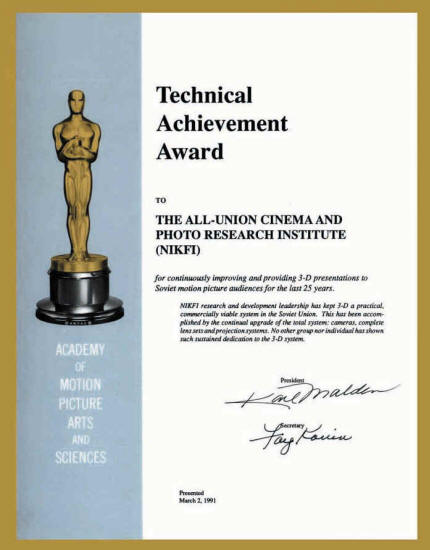 Academy
Award certificate. 2 March 1991 For continuously improving and providing 3-D
presentations to Soviet motion picture audiences for the last 25 years.
NIKFI research and development leadership has kept 3-D a practical,
commercially viable system in Soviet Union. This has been accomplished by
the continual upgrade of the total system: cameras, complete lens sets, and
projection systems. No other group nor individual has shown such sustained
dedication to the 3-D system. Karl Malden, President Academy
Award certificate. 2 March 1991 For continuously improving and providing 3-D
presentations to Soviet motion picture audiences for the last 25 years.
NIKFI research and development leadership has kept 3-D a practical,
commercially viable system in Soviet Union. This has been accomplished by
the continual upgrade of the total system: cameras, complete lens sets, and
projection systems. No other group nor individual has shown such sustained
dedication to the 3-D system. Karl Malden, PresidentOur company as scientific & creative program "STEREOKINO" was created by a group of people for the purpose of improving and developing the 3D movie in Russia. One of the founders of our company is the director of Stereokino laboratory in NIKFI (Russian Scientific Research Cinema and Photo Institute) - Sergey Rozhkov. In 1991 his laboratory was awarded a Technical Achievement Award by American Academy of Motion Picture Arts and Science for a long and successful work in the field of 3D. The company's activities cover all areas of 3D movie business from shooting and releasing 3D movies, manufacturing special 3D equipment and converting cinema theaters for 3D showing. The company is a world leader in utilization a highly technological 3D "STEREO 70" (side by side) movie production system developed by NIKFI in the mid-60's in Soviet Union. The company with NIKFI has converted 75 national theaters into 3D system during the last five years and the total number of 3D theatres reaches one hundred on the territory of Russia. Each month we modernize one theater with 3D capabilities. |
|
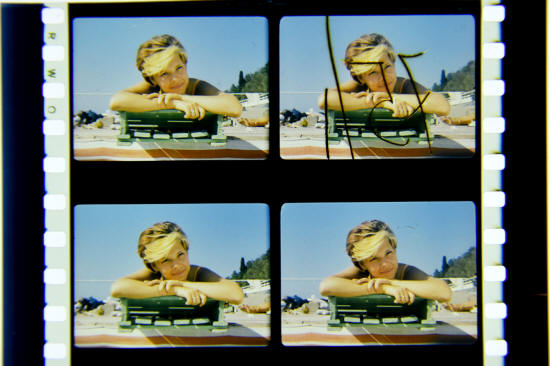 "STEREO
70" 3D film printed on ORWO 70mm stock. Frames supplied by Alexander
Melkumov. "STEREO
70" 3D film printed on ORWO 70mm stock. Frames supplied by Alexander
Melkumov.Click to see enlargement In system "STEREO 70" 3D movie film print can be released in two different formats. The 70mm format is applied for theaters with a capacity up to 600 people, and 35mm anamorphic format for theatres with a capacity up to 200 people. • Go to films in Stereo-70 Three-Dimensional Cinematography in Russia We have a close cooperation with STEREOVISION company in the United States and it's president Chris J. Condon (1923 – December 19, 2010) was a good friend of our team. One of the points of our cooperation is an adaptation of American "OVER UNDER" and Russian "SIDE BY SIDE" systems. One of the main direction in our research is production of equipment for 3D cinemas in Russia and the territory of the former USSR. Recently due to the economic problems, 3D movie production in Russia has stopped. The last film we have shot was in 1994, and now we pay more attention to the adaptations of 'over under' system movies for Russian markets. |
|
Russian Stereo-70 Cameras for Large Format 3D Filmmaking |
|
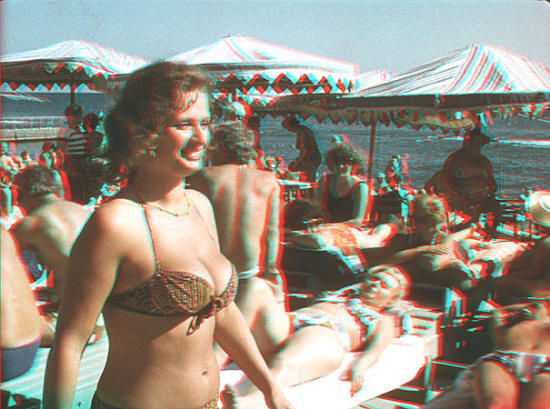 3D
frame from the Stereokino short film "Hello, Sochi" 3D
frame from the Stereokino short film "Hello, Sochi"Simplify and reduce the costs of 3D Large Format filmmaking with a combination of Russian-made 3D cameras and digital conversion process, such as IMAX DMR™. Stereo 70 cameras capture stereo-pairs side by side on a 5/70 frame. Each eye having an area of 18,2 x 26mm, about the size of a standard 35mm frame. This matches the aspect ratio of 15/70 and with appropriate digital up-res (by DMR, for example) provides higher quality results than shooting on digital 2K camera. Stereo 70 cameras are considerably lighter, more flexible and better equipped specifically for 3D shooting than existing 15/70 or 8/70 3D cameras or rigs. The cameras are also well suited to making 3D films intended for 35mm, digital 2K or 3D DVD. The prolonged period of return on investments in production is the main obstacle of the giant-screen 3D cinema development. In case of 3D, using 70mm 15-perforation film frames, both dimensions and weight of film-making and projection “large-format” technology equipment, increase drastically. More than twice, and they grow in geometrical progression, as compared with the traditional 35-mm format. |
|
|
The weight of the 3D film shooting rig reaches almost 200 lb, and it loses to modern movie cameras in mobility. Thus, a producer is more comfortable working in the area of computer 3D animation, instead of being on the set. There is a dangerous tendency of retreat from the real-life 3D shootings into the virtual worlds of digital technologies. 3D-film producers seek new technologies, which would allow reaching the effect similar to natural. In spite of the fact that some producers have already declared the production of some projects with application of the digital technology, no final solution of this technology has been found as yet. And the reason is not only insufficient resolution of the existing digital cameras, but also the fact that the offered two digital cameras junction is fundamentally unable to accomplish a correctly calculated filming stereography, which is proved by stereographic faults in the created films based on this technology, despite of their creators’ authority. Such faults make the viewer feel discomfort close to pain. At the same time, IMAX presented its new DMR (Digital Mastering Reconstruction) technology, which stipulates converting the traditional 35mm films into 15/70 format through scanning and digital processing with application of a special program. Results are impressive: the company has already released commercial films, including “Apollo 13”, “Matrix, Reloaded”, “Matrix, Revolutions”, and “Harry Potter” films. Along with the high appreciation of DMR results, StereoKino suggests to use the idea of this technology directly in production of films intended for the giant screen, in particular, in production of 3D films using Russian Stereo 70 system. |
|
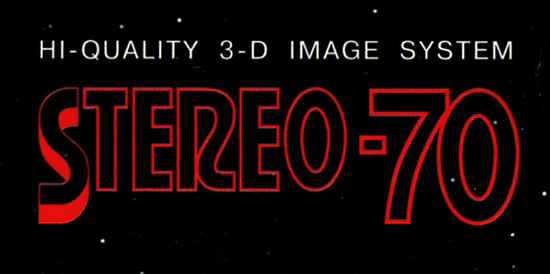 The compatibility of IMAX 3D and Stereo-70 systems by the frame ratio,
allows the use the Russian technology at the start, directly in the shooting
process, with the subsequent conversion of a 5/70 format stereo-pair of two
adjacent 18,2 x 26mm frames into 15/70 format on two films. It will allow
essential savings in the film-making process and permit to solve the problem
of mobility and competitiveness compared to the conventional film
production. The informational capacity of 35mm frame is much higher than the
contemporary digital format, and the specialized Russian 3D cameras are most
manageable in the sphere of stereography. The compatibility of IMAX 3D and Stereo-70 systems by the frame ratio,
allows the use the Russian technology at the start, directly in the shooting
process, with the subsequent conversion of a 5/70 format stereo-pair of two
adjacent 18,2 x 26mm frames into 15/70 format on two films. It will allow
essential savings in the film-making process and permit to solve the problem
of mobility and competitiveness compared to the conventional film
production. The informational capacity of 35mm frame is much higher than the
contemporary digital format, and the specialized Russian 3D cameras are most
manageable in the sphere of stereography.Russian technology for making the motion pictures gives economic solutions of 3D films promotion not only in IMAX 3D theatres and in the 3D digital cinema. |
|
Digital Photography for the 21st Century |
|
 16.04.2017 16.04.2017Please note, that we have changed to digital photography. Instead of 65mm film cameras, we are now using the “Phantom 65 Gold” digital cameras. We are using the big sensor with same size as 70mm format. In 2011 we shot the full length 3D movie “The Best Film in 3D” (105 min). We are still using the “Stereo-70” 3D lenses, but all in digital format. With best regards, Alexander Melkumov Stereokino, Moscow, Russia +79 1040 91 945 |
|
| Go: back - top - back issues - news index Updated 22-01-25 |
